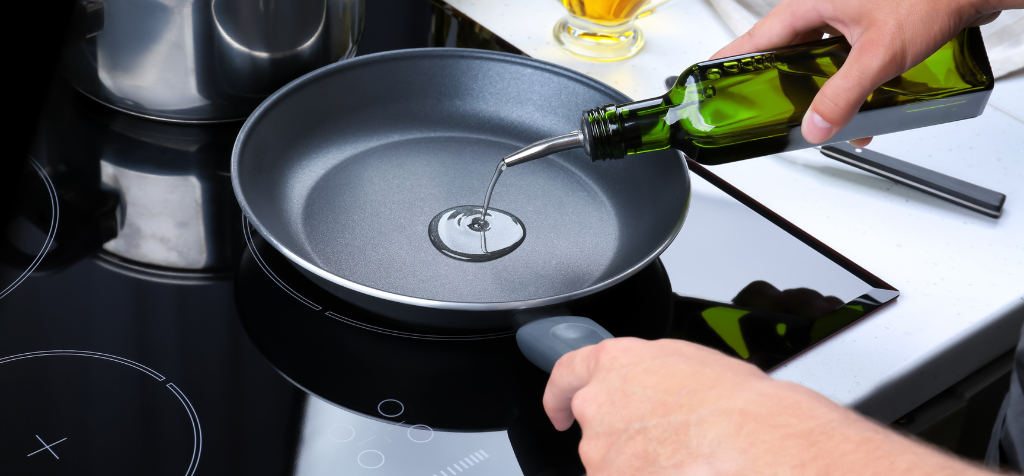Restore
revive
get back to health
revive
get back to health
Join our email list!

Increasingly, we see that what we might have been told for decades about cooking oils isn’t necessarily true. Industrial seed oils like corn oils, canola, and soybean oils aren’t the healthy options we’ve been sold, and there’s a growing amount of evidence to show they might even make us sick or at least pull us farther away from optimal health.
As a society, we’ve shifted away from the use of cooking with traditional fats, like ghee, butter, coconut, and even olive oil, instead favoring oils that are highly processed and only became part of the Western diet at the start of the 20th century.
The introduction of industrial seed oils was in soapmaking, but for some reason, possibly cost or a misunderstanding of health needs, these have become the norm in our diet. These oils could be an underlying factor in the chronic negative health effects we increasingly face in the United States.
The oils you use for cooking can be nourishing if you swap out seed oils in favor of better options.
Seed oils are types of vegetable oils. It’s a broad catch-all term for any oils from plant sources. Among the most common seed oils and vegetable oils used in food manufacturing and preparation in America include:
Margarine is another potential seed oil to avoid, although we don’t always classify it as such. Margarine is a blend of oils from unsaturated fats, while real butter is made from cream or milk.
Making seed oils is very industrialized, so you’ll sometimes hear them called “industrial seed oils.”
The seeds are gathered from cotton, corn, soy, rapeseed, and safflower plants and then heated to high temperatures. The unsaturated fats in the seeds oxidize when exposed to high heat, which can create potentially harmful byproducts.
Then, the seeds are processed, often with hexane or another petroleum-based solvent. That processing allows for the most oil extraction.
Seed oils can have a bad odor after they’re extracted, so chemicals are used to remove that smell, creating trans fats. Then, it’s common to add more chemicals that improve the color and appearance of the oils, making them more marketable and appealing to consumers.
In the 1940s, cardiologists started to endorse seed oils as a better, healthier alternative to what was traditionally used, which were animal fats. There was also research introduced linking saturated fat and the intake of cholesterol with heart disease. The recommendation of major medical advocacy groups and researchers in the mid-20th century was to consume more polyunsaturated fats or PUFAs, which meant more consumption of seed oils and margarine.
Relatively newer research has found no significant health benefit from increasing your PUFA intake from vegetable oils or from reducing saturated fats.
Seed oils have quite a few potential problems for human health.
First, we didn’t consume these industrialized oils until the 1900s, and between 1970 to 2000, intake went up enormously. Now, linoleic acid, which is the main fatty acid in industrial seed oils, makes up a significant portion of our total caloric intake, and chronic illnesses have seemingly risen as consumption has gone up.
There are categories of essential fatty acids, which are omega-6 fatty acids and omega-3s. When we consume omega-6 fatty acids, they can raise inflammation, while omega-3 fatty acids can help dampen inflammation. We need the right balance between the two types of fatty acids for good health, yet seed oils can raise the ratio of omega-6 fatty acids in our bodies, leading to chronic inflammation.
Another problem with seed oils is that they aren’t stable. When exposed to heat and light, they create harmful substances, so cooking with them worsens the negative effects.
There are also many additives included in seed oils to prevent them from going bad and to avoid oxidation, but these synthetic antioxidants can be disruptive to the endocrine and immune systems.
There are good sources of fat that you can use for cooking that will be more natural and nourishing.
These include:
Along with the rise in industrial seed oils, we’ve also been conditioned in the past few decades to see fat as the enemy. In reality, healthy sources of fat with minimal processing are incredibly important for our well-being.
For example, good fats can fuel our brain and keep it healthy and maintain cognitive function. Healthy fats are important for digesting fat-soluble vitamins, which include A, D, E, and K. These vitamins are critical for hair, skin, and nail health, as well as our brains, hormones, and tissues.
Eating fat supports your hunger hormones, so you feel fuller faster and they’re a slow-release energy source, so you’ll get the most energy from consuming enough in your diet.
If you’d like to know how to be a healthier version of yourself through tailored wellness programs, please reach out to Intuitive Health Restoration. There are so many issues like bloating, fatigue, autoimmune disorders, and issues with menopause and hormones that seem to be untreatable or ignored by conventional medicines and approaches, whereas lifestyle changes can have a significant impact.
Contact Integrative Health Restoration to begin uncovering root causes rather than just targeting symptoms as they pop up, and we’ll create a personalized solution and plan for you.